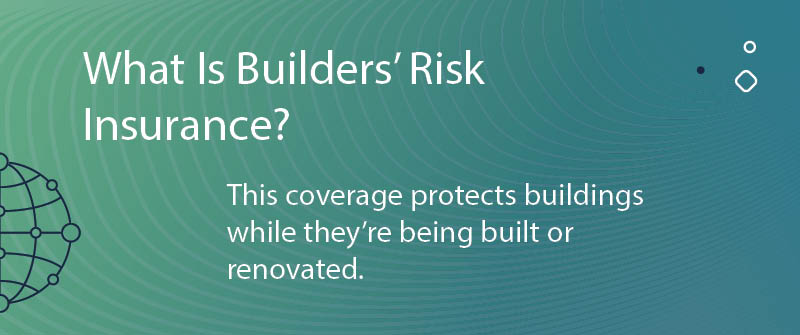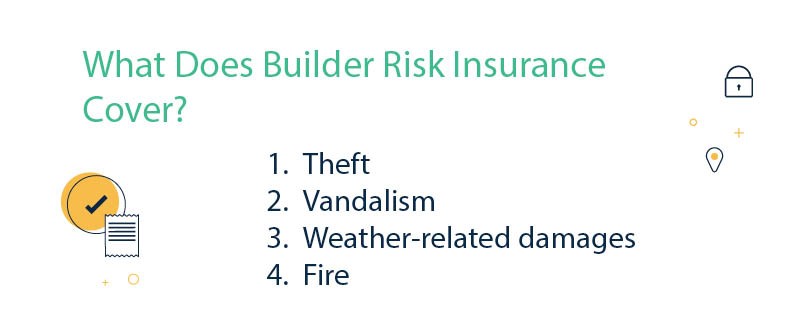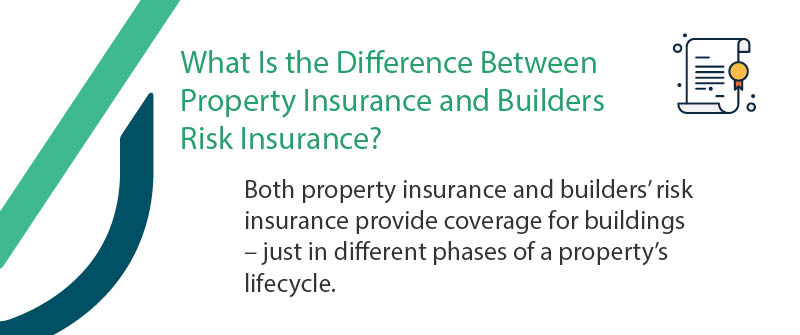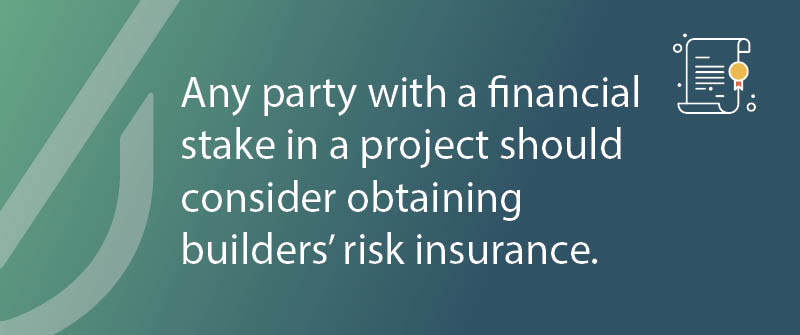
Accidents happen every day. That’s why, in the dangerous line of work in construction, it is so important to take steps to protect properties from the many possible damages that could occur while under construction. That’s where builder’s risk insurance comes in.
This coverage, also sometimes referred to as course of construction insurance, protects buildings while they’re being built or renovated. While this coverage is often misunderstood, it can be necessary to hold this kind of policy in order to comply with government regulations, maintain strong risk management practices, and avoid the threat of litigation and fines.
Understanding the purpose and scope of builders’ risk insurance is crucial for successful construction projects. Whether you’re a property owner, developer, contractor, or lender, having the right insurance coverage is vital for safeguarding your investment and ensuring a project’s successful completion.
Follow along as we explore the concept of builders’ risk insurance, including what it does and doesn’t cover, who needs it, and more. Once you’ve read up on ensuring compliance through comprehensive coverage, be sure to explore the rest of our blog to learn more about how our Certificate of Insurance Services can help keep projects on track, ensuring that all required documents are in order and up to date.

What Is the Purpose of Builder Risk Insurance?
Builders’ risk insurance is a specialized kind of property insurance intended to provide financial protection during construction projects or renovations. It essentially protects buildings while they’re under construction, covering physical losses or damages that can occur before structures are used for their intended purpose. Obtaining a builder’s risk insurance policy is crucial for protecting construction projects from property damage and covering additional costs.
This is a temporary policy, with coverage typically beginning alongside construction and ending when a project is completed and a building is ready for occupancy or use. Policyholders can also extend this coverage if necessary, such as if delays occur that slow down a project’s timeline. Once a project is completed, the builders’ risk insurance policy expires, and the owner usually transitions to a standard property insurance policy to protect the building.
The builder’s risk insurance cost can vary significantly based on the size and scope of construction projects, the location, and additional coverage needs. Understanding individual project requirements is essential to accurately determine costs.
There are many types of construction insurance coverage for many kinds of construction projects, from residential buildings to commercial properties to public infrastructure projects and more. This policy, like others, is highly customizable so that people and groups can get coverage that aligns with their project’s specific risks and needs.
What Does Builder Risk Insurance Cover?
Builder’s risk insurance cover includes a broad range of risks that could happen, such as the following:
- Theft
- Vandalism
- Weather-related damages (e.g., hailstorms, windstorms, lightning, etc.)
- Fire

With additional endorsements to builders’ risk insurance policies, they could also provide coverage for things like:
- Faulty design or workmanship
- Materials in transit or stored offsite
- Temporary structures
However, builders’ risk insurance is not a catch-all policy, and it’s important to note some common causes of loss that this coverage will not protect against, such as:
- Certain natural disasters (e.g., earthquakes and tornadoes unless specified)
- Wear and tear or rust and corrosion (damages that should’ve been prevented by general maintenance)
- Acts of terrorism or war
- Human error or faulty design
- Workplace accidents (covered by liability insurance)
What Is an Example of a Builder’s Risk Policy?
Builders’ risk policies will vary widely depending on the scope and location of the construction project. To highlight some of those differences, let’s walk through a few hypothetical regional examples of builders’ risk policies in action. It is crucial to evaluate risks at the construction site to determine appropriate insurance coverage, ensuring that all potential risks, such as theft, vandalism, and damage, are covered throughout various stages of the project.
Scenario 1: Residential Construction in Texas
A family goes to a homebuilder to have them construct a new single-family home for them in the suburbs of Houston, Texas. Being a coastal area, the location is vulnerable to hurricanes, which the builder took into account when purchasing a comprehensive builders’ risk insurance policy. They made sure to spring for one that included damage for wind damage, flooding, and debris removal.
About halfway through the project, disaster strikes, and a hurricane hits the structure, causing significant damage to the structure and materials. Thankfully, the builders’ risk policy covered the cost of repairs, debris removal, and even some of the lost construction materials, allowing the project to continue with minimal financial loss to the builder. This highlights the importance of builder’s risk coverage for individuals and companies with a financial stake in construction projects.
Scenario 2: Commercial Building in Florida
A developer in Miami, Florida is building a new commercial office building downtown. They chose to purchase a builders’ risk insurance policy that included coverage for windstorm damage, as well as coverage for theft of materials from the site.
It is crucial to include all parties with a financial interest in the project, such as contractors, developers, and lenders, as insureds to ensure comprehensive coverage in the policy.
During the construction phase, a powerful windstorm caused substantial damage to the building’s framework. Not only that but in the wake of the storm, various pieces of construction equipment were taken from the site. Luckily, the builders’ risk policy covered the cost of repairs and replacement for the stolen items, ensuring that the project stayed on track.
What Is the Difference Between Property Insurance and Builders Risk Insurance?
Both property insurance and builders’ risk insurance provide coverage for buildings – just in different phases of a property’s lifecycle.
Builders’ risk insurance is actually considered a type of property insurance but is specifically designed to cover structures during the construction phase. It includes property coverage for physical damage, liability coverage or loss due to events such as fire, windstorms, theft, and vandalism. It may also cover materials, equipment, and machinery used in the construction process, whether they are on-site, in transit, or stored offsite.
Alternatively, property insurance is mainly intended to cover buildings and their contents once construction is complete on a site and a property is in use. Property insurance typically covers damages caused by events like fire, theft, and natural disasters. However, unlike builders’ risk insurance, it also covers liability issues related to the property, such as injuries that occur on the premises.

Situations where this coverage is applicable include:
- When a building is under construction: builders’ risk insurance
- When a building is completed and in use: property insurance
Do I Need Builders’ Risk Insurance?
Assessing the need for builders’ risk insurance is an important skill for builders to have. Whether you need it or not will largely depend on the nature and scope of a construction project. For example, consider the specific risks that your project will be under threat of, such as regional weather patterns. As a builder, to be safe, always assume that you’ll need a few kinds of coverage – typically a general liability policy and builders’ risk insurance, at the least.
Any party with a financial stake in a project should consider obtaining builders’ risk insurance. This could include property owners, general contractors, subcontractors, and even lenders who may require proof of insurance before providing financing. It is not uncommon for lenders, or people who provide loans to finance construction projects, to require this insurance as a condition of lending, in order to ensure that their investment is protected.
When obtaining builders’ risk insurance, it is crucial to compare different insurance providers to find the best coverage and policy limits that suit your construction needs.
This coverage is typically purchased by the property owner, developer, general contractor, or subcontractors. If you are purchasing the policy, consider adding any relevant stakeholders, such as the ones mentioned above, as insureds.
Builders’ risk insurance is essential for large-scale projects where financial losses could be large. However, it can also be beneficial in smaller projects in order to cover unexpected events that could otherwise result in substantial and unattainable out-of-pocket expenses. Ultimately, if you are financially invested in any way in a building that is under construction, you should ensure that it is insured by builders’ risk coverage.

Reduce Your Risk With Experts By Your Side
Still unsure whether or not you need builders’ insurance or about the various compliance requirements you will be expected to meet throughout a project?
Ensure your project’s and your workers’ protection and compliance today by reaching out to our team of experts. We can help you understand your project’s needs and the local and federal regulations that govern your compliance – then make sure everything looks up to snuff.
Don’t get shocked by lapses in coverage or uninsured workers. Plan ahead with our COI services by reaching out to us today.